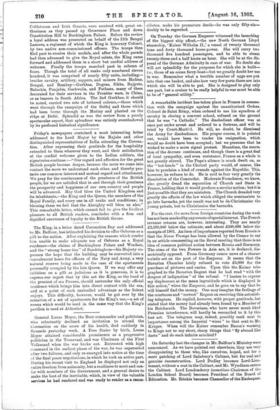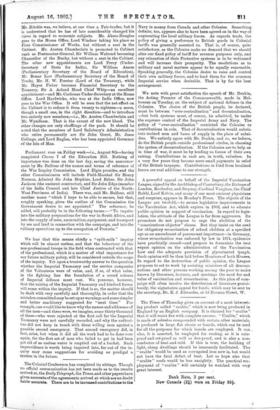On Saturday last the changes in Mr. Balfour's Ministry were
announced. As we have pointed out elsewhere, they are very disappointing to those who, like ourselves, hoped, not for a mere patching of Lord Salisbury's Cabinet, but for real and genuine reconstruction. Lord Dadley becomes Lord-Lieu- tenant, without a seat in the Cabinet, and Mr. Wyndham enters the Cabinet. Lord Londonderry (sometime Chairman of the London School Board) becomes President of the Board of Education. Mr. Ritchie becomes Chancellor of the Exchequer. Mr. Ritchie was, we believe, at one time a Fair-trader, but it is understood that he has of late considerably changed his views in regard to economic subjects. Mr. Akers-Douglas goes to the Home Office, Lord Windsor taking his place as First Commissioner of Works, but without a seat in the Cabinet. Mr. Austen Chamberlain is promoted to Cabinet rank as Postmaster-General, Sir William Walrond becoming Chancellor of the Duchy, but without a seat in the Cabinet. The other new appointments are Lord Percy (Under- Secretary of State for India), Sir William Anson (Parliamentary Secretary of the Board of Education), Mr. Bonar Law (Parliamentary Secretary of the Board of Trade), Mr. H. W. Forster (Lord of the Treasury), while Mr. Hayes Fisher becomes Financial Secretary to the Treasury, Sir A. Acland Hood Chief Whip—an excellent appointment—and Mr. Cochrane Under-Secretary at the Home Office. Lord Hardwicke, who was at the India Office, now goes to the War Office. It will be seen that the net effect on the Cabinet is to reduce it from twenty to eighteen—a move, though a small one, in the right direction—and to introduce two entirely new members,—i.e., Mr. Austen Chamberlain and Mr. Wyndham. That is the extent of the new blood. The other changes are only shuffiings of the pack. It should be noted that the members of Lord Salisbury's Administration who retire permanently are Sir John Gorst, Mr. Jesse Collings, and Lord Raglan, who has been appointed Governor of the Isle of Man.



































 Previous page
Previous page